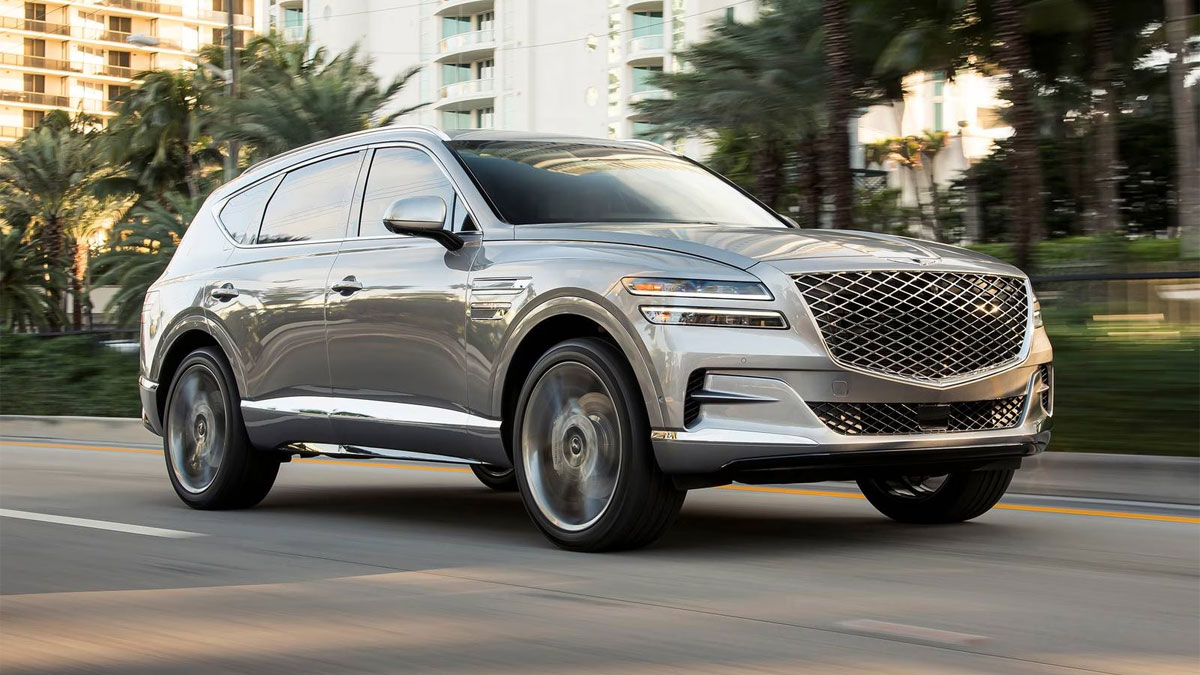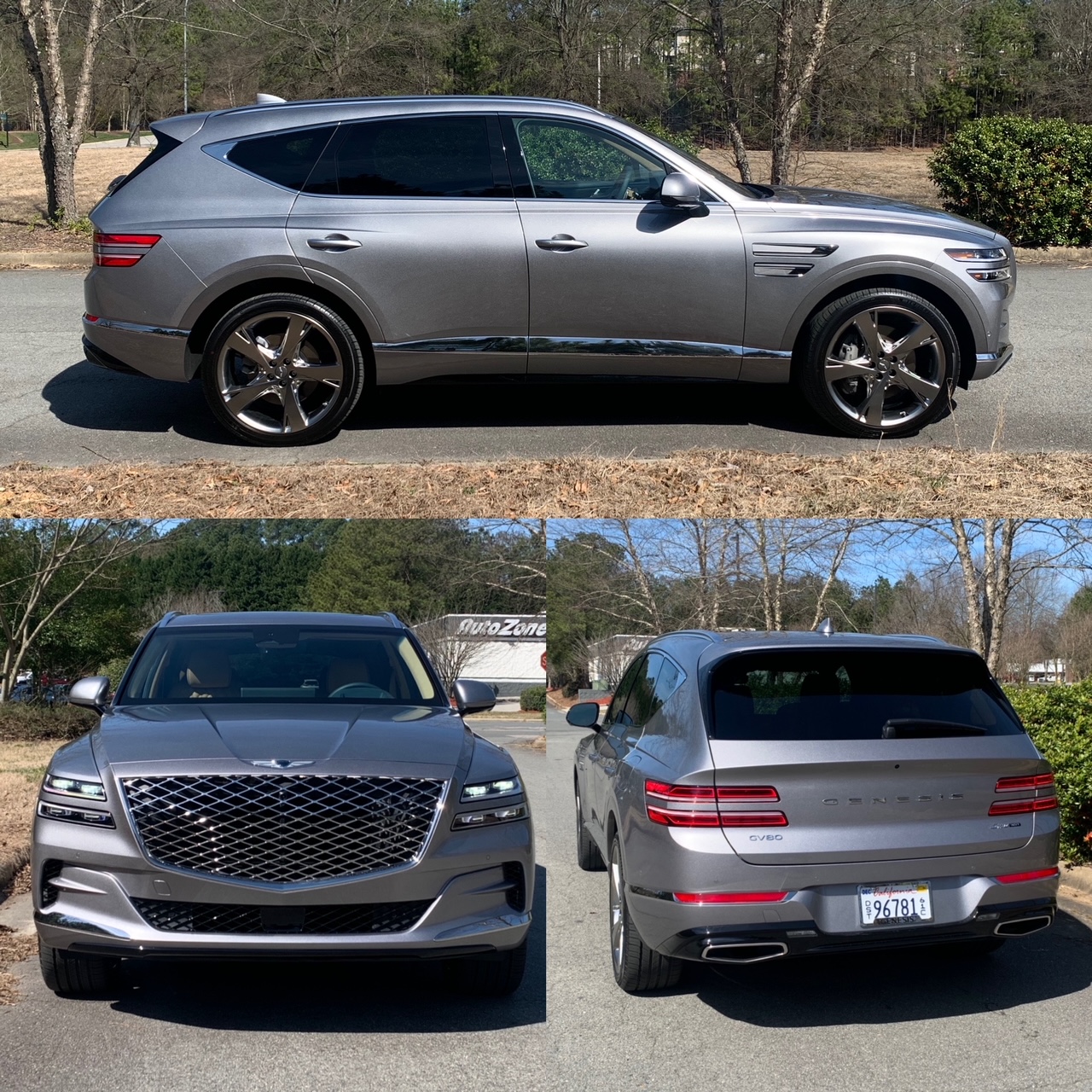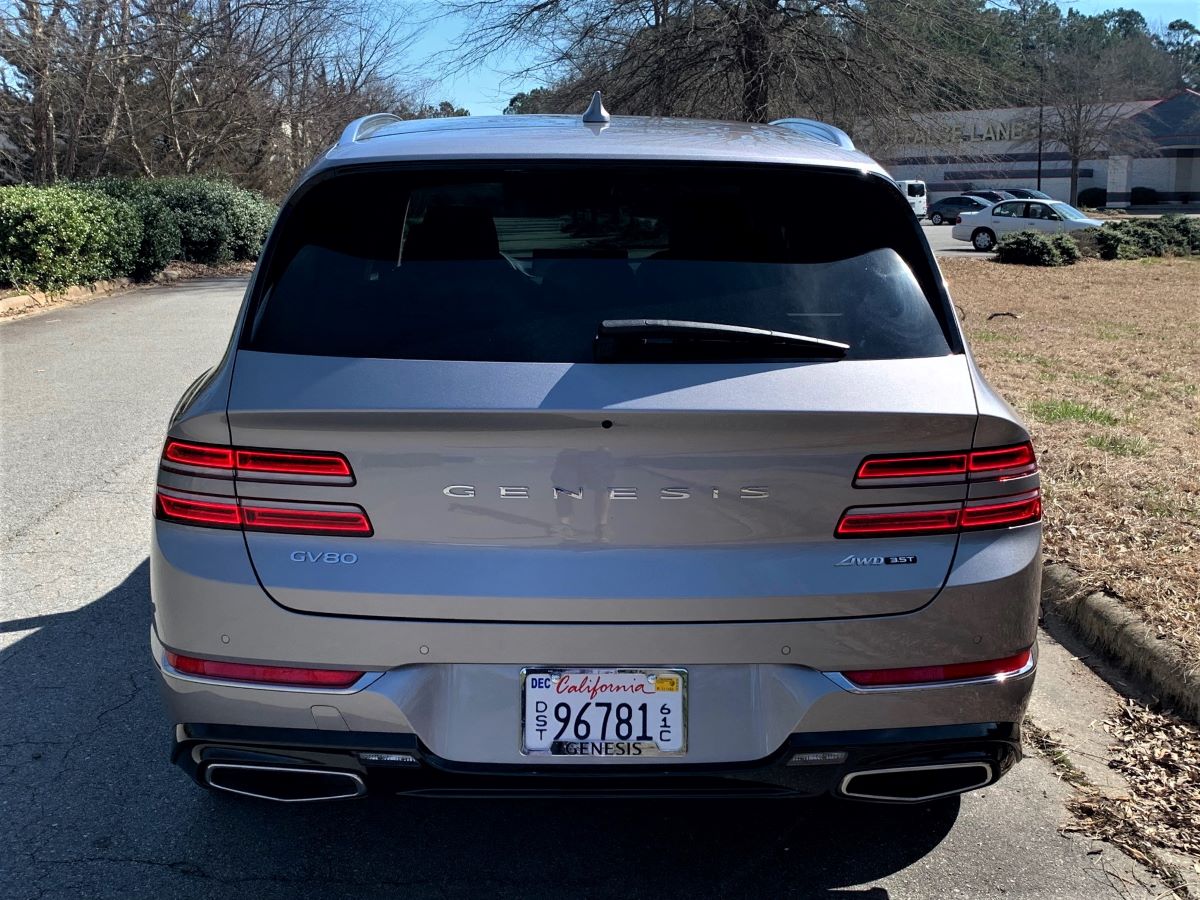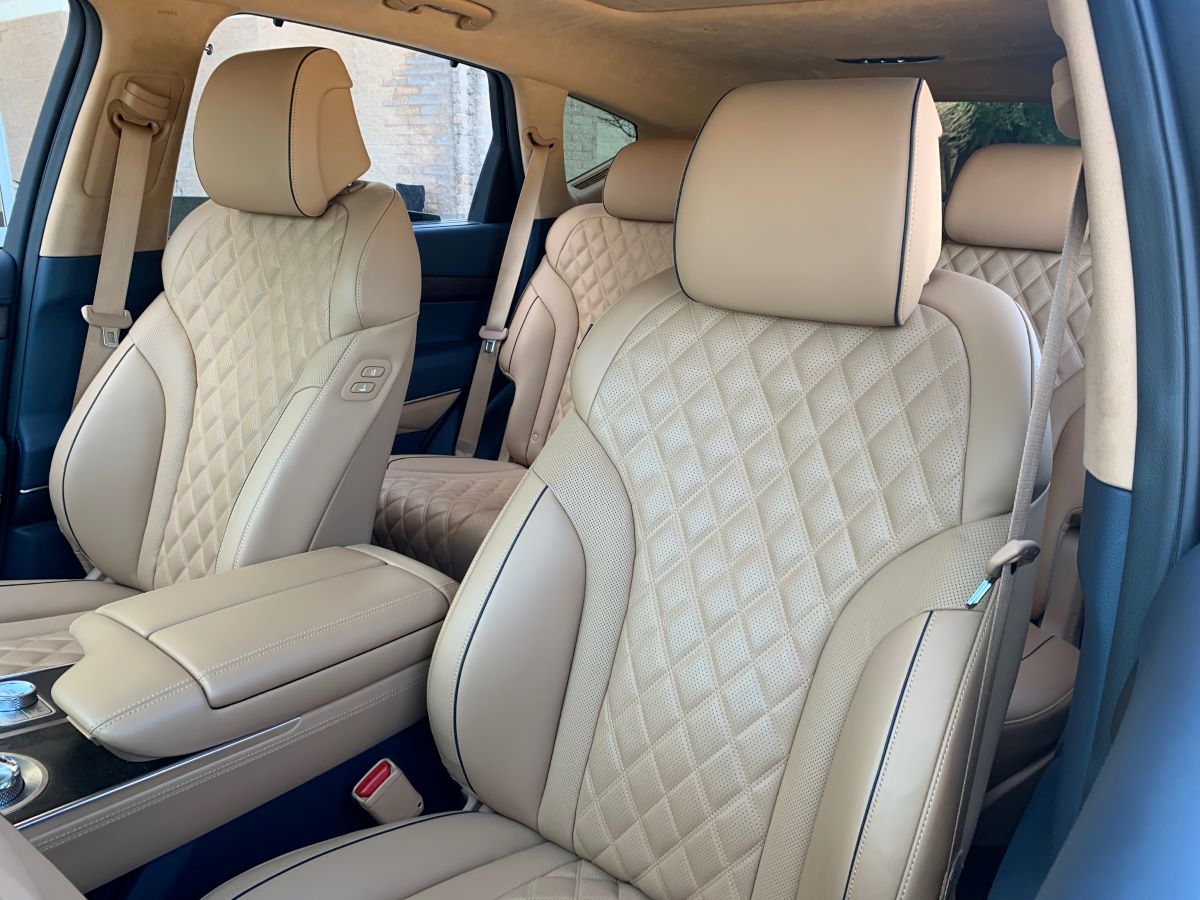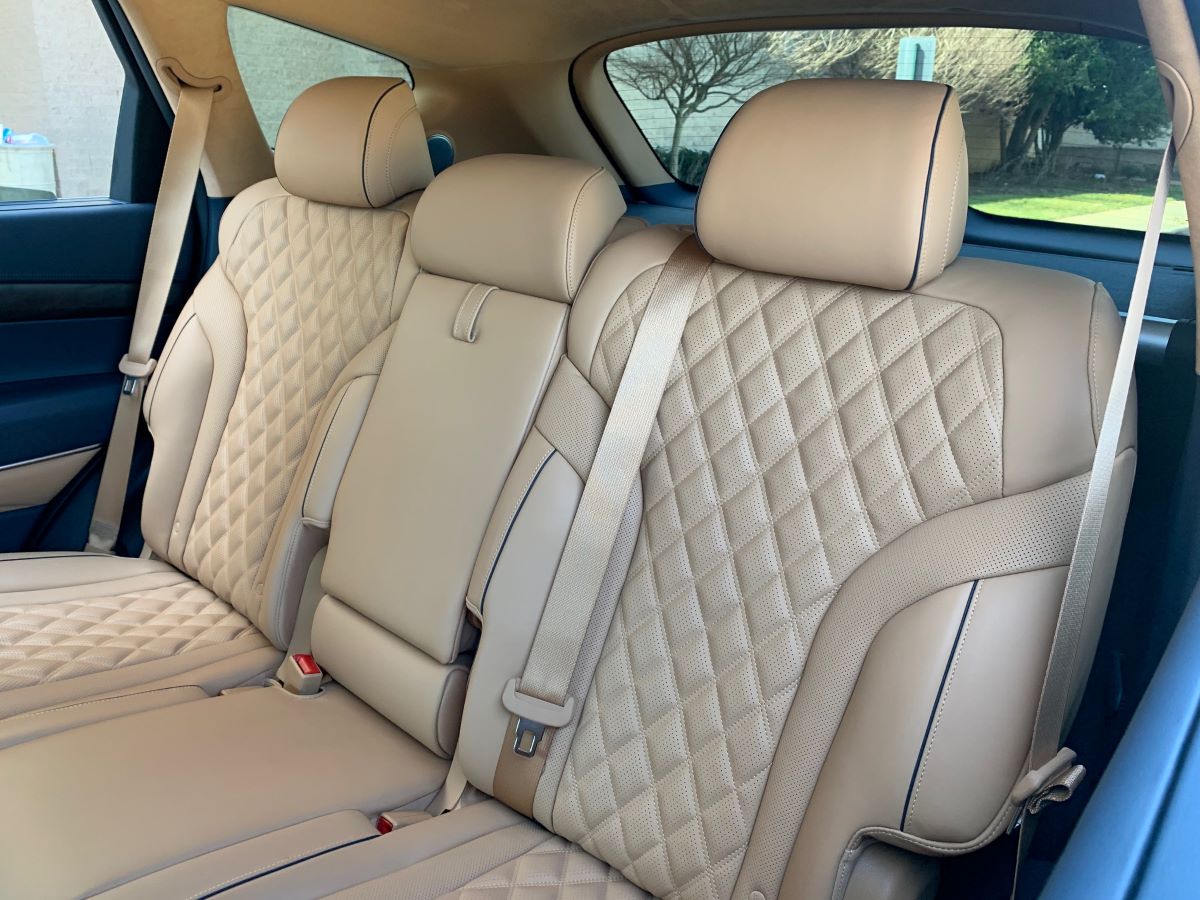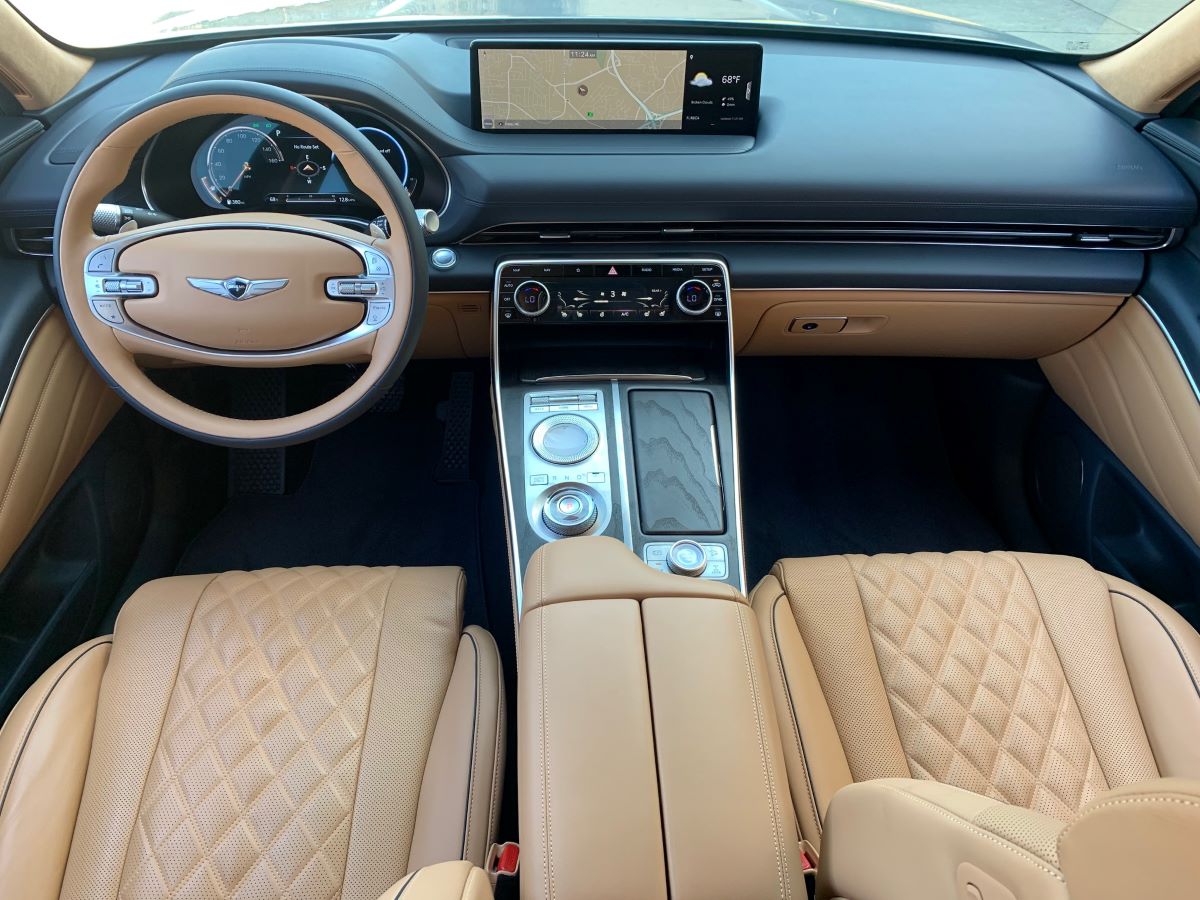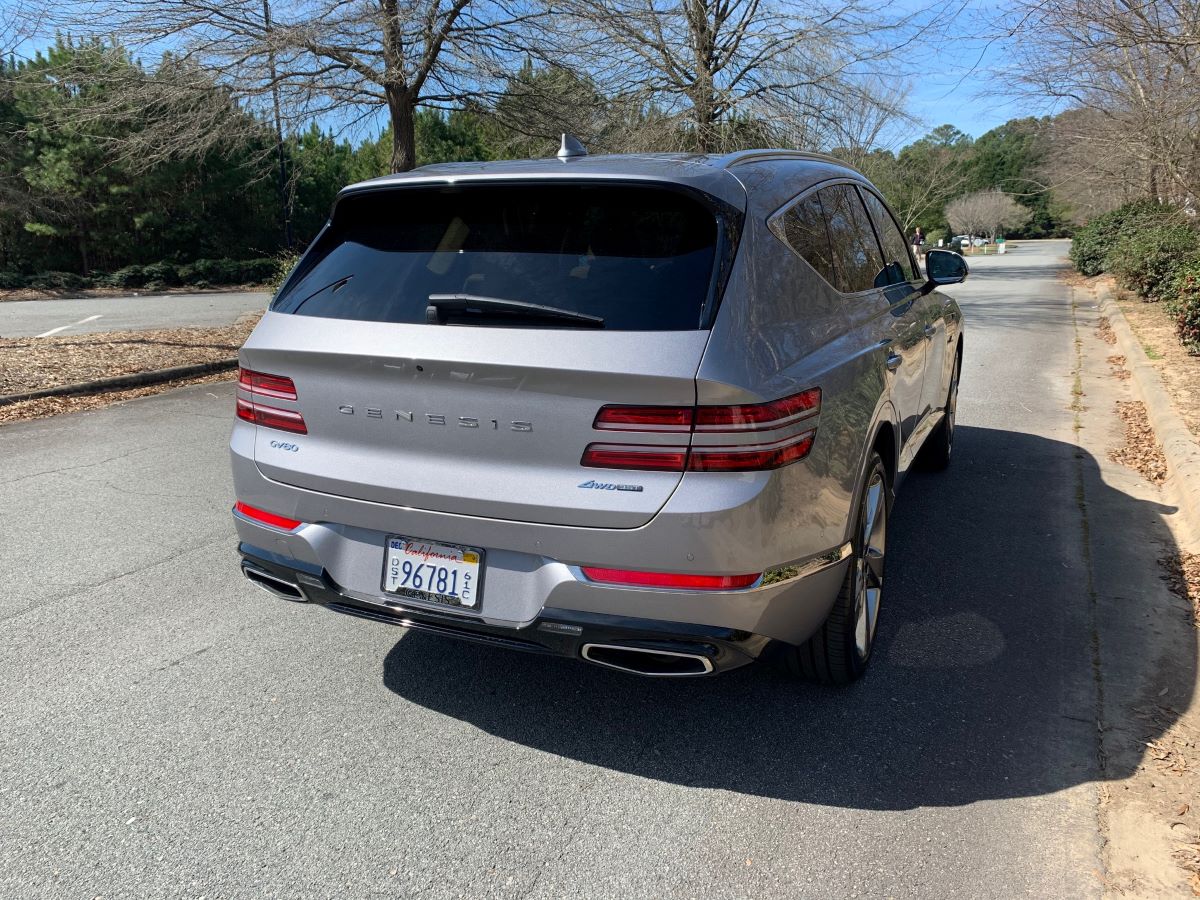Genesis hints at a new gilded age with the genteel GV80 SUV.
The Genesis GV80 is one of the most anticipated new vehicles of the year. That’s because after releasing three consecutive sedans, Hyundai’s luxury moniker has finally added an SUV.
And not just any utility vehicle. The 2021 GV80 is a strong entry with high-end styling, a glamorous cabin, ample safety and tech features, and two new engine choices. If you’re shopping for a luxury model, you’ll want to include Genesis on your list.
The GV80 makes a strong case for itself and shouldn’t be overlooked.
2021 Genesis GV80 Review
The 2021 Genesis GV80 is available in four trims and costs from $48,900 to $65,550, plus a $1,045 freight charge. It has standard rear-wheel drive and available all-wheel drive.
Genesis supplies a choice of four- and six-cylinder turbocharged engines paired with automatic transmissions. The GV80 offers standard seating for five or for seven with an available third row.
Exterior
Where do we being with the Genesis GV80? At first glance, it seems like a very expensive model, perhaps one costing in the six-figures. In reality, it starts at half that cost, but it incorporates features that you wouldn’t expect on this model. At least not for the price.
The GV80’s silhouette is elegant and strong – its front fascia is marked by a huge diamond-shaped or crest grille, the same look found on the sedans, but we think it wears it best. Beautifully bisected LED lights meet where the grille intersects with the hood. The GV80’s formal face includes cutouts and a lower air intake.
We were wowed by the powerful sculpting that connects the top edges of the grille, cuts across the hood, and moves down this SUV’s prodigious profile. That side-view projects strength with its upgright pillars, high beltline, and big wheel arches.
The most noticeable accents include the LED lights where the portholes usually reside and the large swath of sheet metal where the roofline meets the beltline.
To the rear, the GV80 utilizes a similar lighting design as the front, with huge lights wrapping around the tail. The tailgate is large and the lights rest within a concave section, adding an interesting mark on the back side.
An oversized spoiler, wraparound fog lamps, and dual exhaust ports put the final statement on the rear.
The list of standard exterior features is long and includes full LED quad headlights, automatic headlights, high-beam assist, LED daytime running lights, rain-sensing wipers, auto-defogging windshield, LED taillights, dual power-folding and heated side mirrors, approach lights with the Genesis logo, and a power hands-free liftgate.
As for options, there are only a few in keeping with the GV80’s “loaded” look. Here, you’ll find a panoramic sunroof on all but the base model and power door closure.
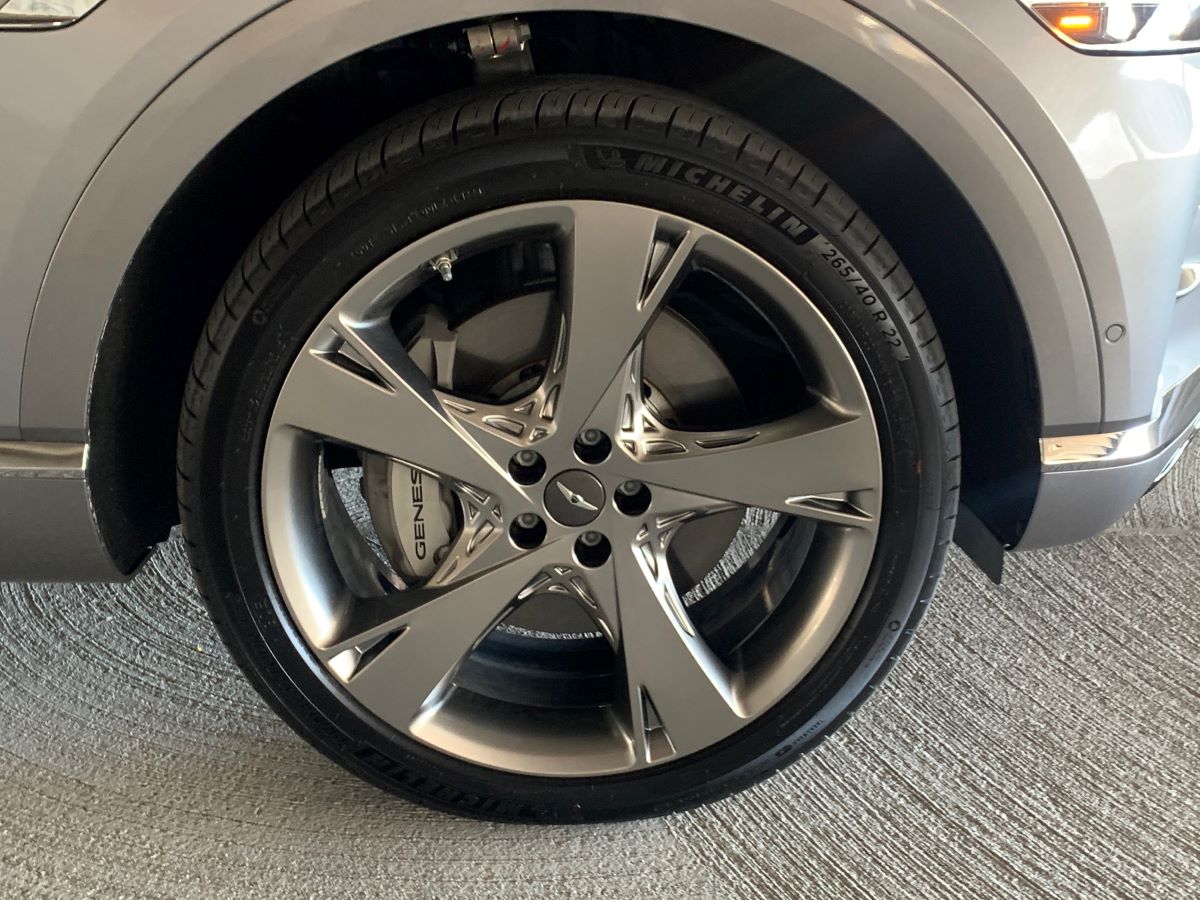
Every trim comes with all-season tires. Genesis supplies 19-, 20-, and 22-inch aluminum-alloy wheels, depending on the trim and package. A donut spare tire is standard or is replaced by a tire mobility kit on some trims.
Interior
Just as we were wowed by the exterior, the GV80’s interior offers its own take on jaw-dropping goodness. The cabin is large, bright, and covered with beautiful materials. Not only is the look gorgeous, but the fit and finish is outstanding.
Seating for five across two rows is standard. Models equipped with the V6 trim allow for an upgrade to a third-row seat. That’s not an option most people will take, unless they need the extra room in a pinch or have small children that can sit back there.
We don’t have the cargo area measurements from Genesis yet, but the space behind the second row is spacious.
Genesis has your comfort in mind no matter where you sit. The base models come with imitation leather, with all other trims dressed in real hides with Nappa leather reserved for the top trims. In our test model we had diamond-shaped quilted leather seats that were wide, thick, and very supportive.
All front seats, regardless of trim, come with power adjustment and lumbar support. Heated front seats are standard; ventilated seats appear on all trims but the base model. At some point, you may feel massaging kicking in as the seat’s multiple pressure points soothe tired backs.
The GV80’s dashboard is uncomplicated with the instrument panel hood cleanly integrated within it. The touch-screen display panel sits long ways (rectangular), occupying a modest amount of real estate. The center console is topped by an HVAC panel with two knobs and finger-touch control. Beneath that is an alcove for wireless device charging.
Two sizable circular controls manage the audio and transmission, respectively. Try not to get confused here and please expect a lengthy learning curve with the top dial.
Fortunately, you can control matters through the touchscreen, steering wheel, or voice. This is the one area where we think Genesis could have given more thought to how customers would perceive it.
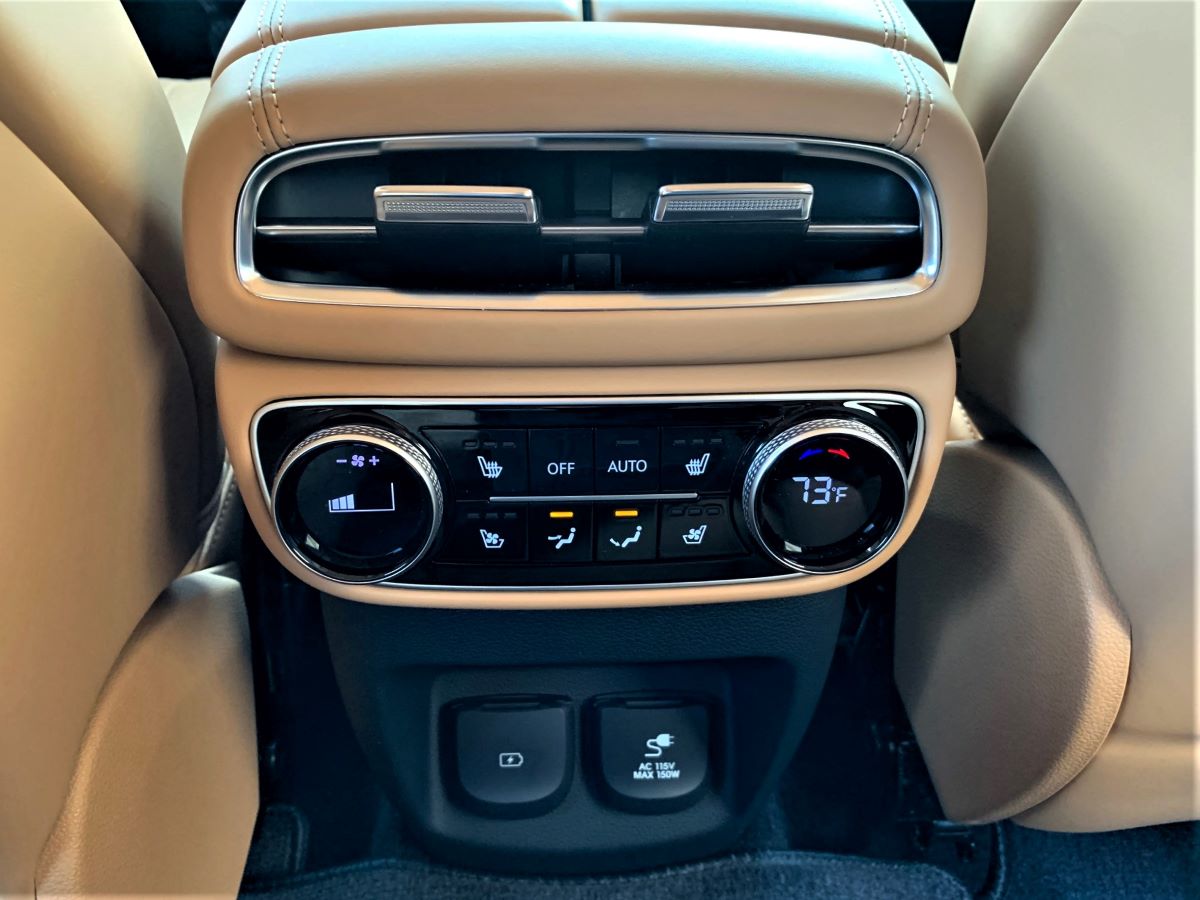
Between the seats is the usual covered storage compartment. We like that Genesis built in a pair of armrests, giving both front passengers a place to rest their arms.
As for the rest of the cabin, the rear 40/20//40 split-folding bench seat offers excellent space for three, although we’d fight for the front passenger seat if we weren’t driving. Heated outboard seats are available.
Beyond the seats, a power tilt-and-telescopic steering column is standard. About half the trims come with dual-zone climate control with three-zone management elsewhere.
Other features generally available beyond the base trim is a heated steering wheel, power-controlled rear side window sunshades, and second-row vanity mirrors. Ambient lighting and a cargo cover are also included.
Safety
The first of two safety scores are in and the GV80 earned the highest rating from the Insurance Institute for Highway Safety (IIHS). The Top Safety Pick+ score doesn’t surprise us as Genesis models continue to reach for the top.
As for the federal NHTSA – National Highway Traffic Safety Administration, we don’t have scores yet, but something tells us that a 5-star safety rating is likely.
Genesis equips all trims with blind-spot collision-avoidance assist with rear cross-traffic collision-avoidance assist, lane departure warning with lane following assist, forward-collision avoidance with pedestrian detection, driver attention warning, and a rear safe exit assist.
Further, smart or adaptive cruise control with full stop and go is standard.
A few other features are not included with the standard model and are trim level or package upgrades. Specifically, Genesis makes optional a blind-spot view monitor, parking collision avoidance assist – rear, forward attention warning, and rear occupant alert.
In all, Genesis supplies a top level of standard safety equipment. We have found competitors making at least some of these features extra, adding thousands of dollars to the price.
Technology
On the tech front, Genesis also offers a long list of standard features. That 14.5-inch display screen occupying the dashboard above the center stack includes navigation. But Android Auto and Apple CarPlay smartphone compatibility comes standard, thus you have a few ways of securing your driving directions.
The previously mentioned wireless charging pad is included on all but the base trim. Also, the GV80 comes with Bluetooth, four USB ports, a 12-speaker audio system with satellite radio and HD Radio, and an 8-inch LCD instrument cluster and analog gauge.
Available features include a 21-speaker Lexicon Quantum Logic Surround Sound Audio System, a 12.3-inch digital 3D instrument panel, and road active noise cancellation. The latter works in part by adjusting the audio system, increasing volume as engine noise climbs. It’s definitely noticeable, but it gets the job done.
Performance
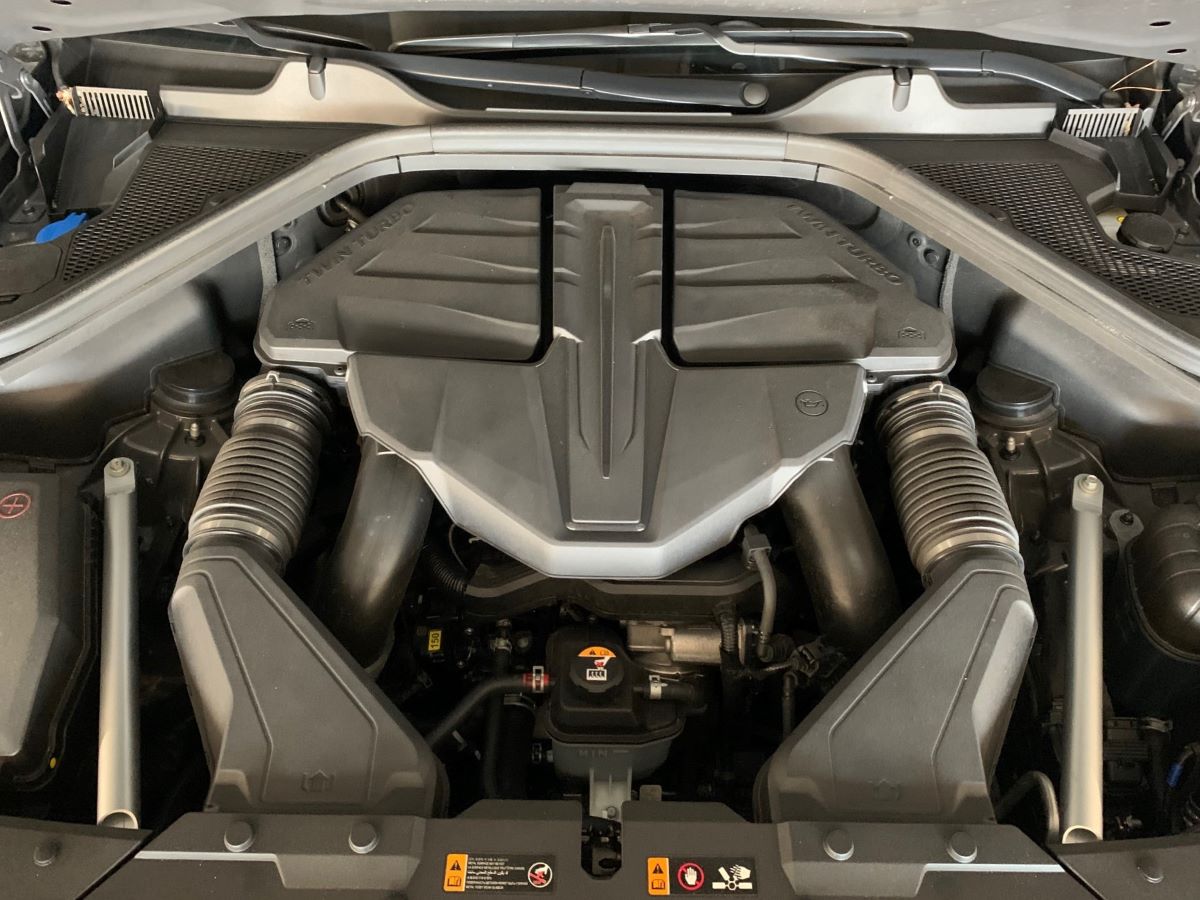
With two engine choices at the ready, your big decision is, which one? The base turbocharged engine displaces 2.5 liters and produces 300 horsepower and 311 pound-feet of torque.
The upgraded twin-turbocharged 3.5-liter V6 engine makes 375 horsepower and 391 pound-feet of torque. Both engines work with an 8-speed shift-by-wire automatic transmission. A drive mode select dial supplies comfort, smart, eco, sport, and custom modes.
Our test model came with the V6, although we’ve driven various Hyundai/Kia models with the four-cylinder engine. We can say that the “four” works well, although we noticed that it’s optimally tuned in the Genesis to maximize power. That shouldn’t be a surprise because with 4,500-plus pounds to move, it needs to be strong.
The V6 is strong and entirely suited for the GV80. For instance, it moves away from a dead stop with confidence and supplies ample power as needed. The twin turbos spool fast, ensuring that turbo lag is imperceptible. Under hard acceleration the engine roars, the transmission downshifts immediately, and the pace quickens without delay.
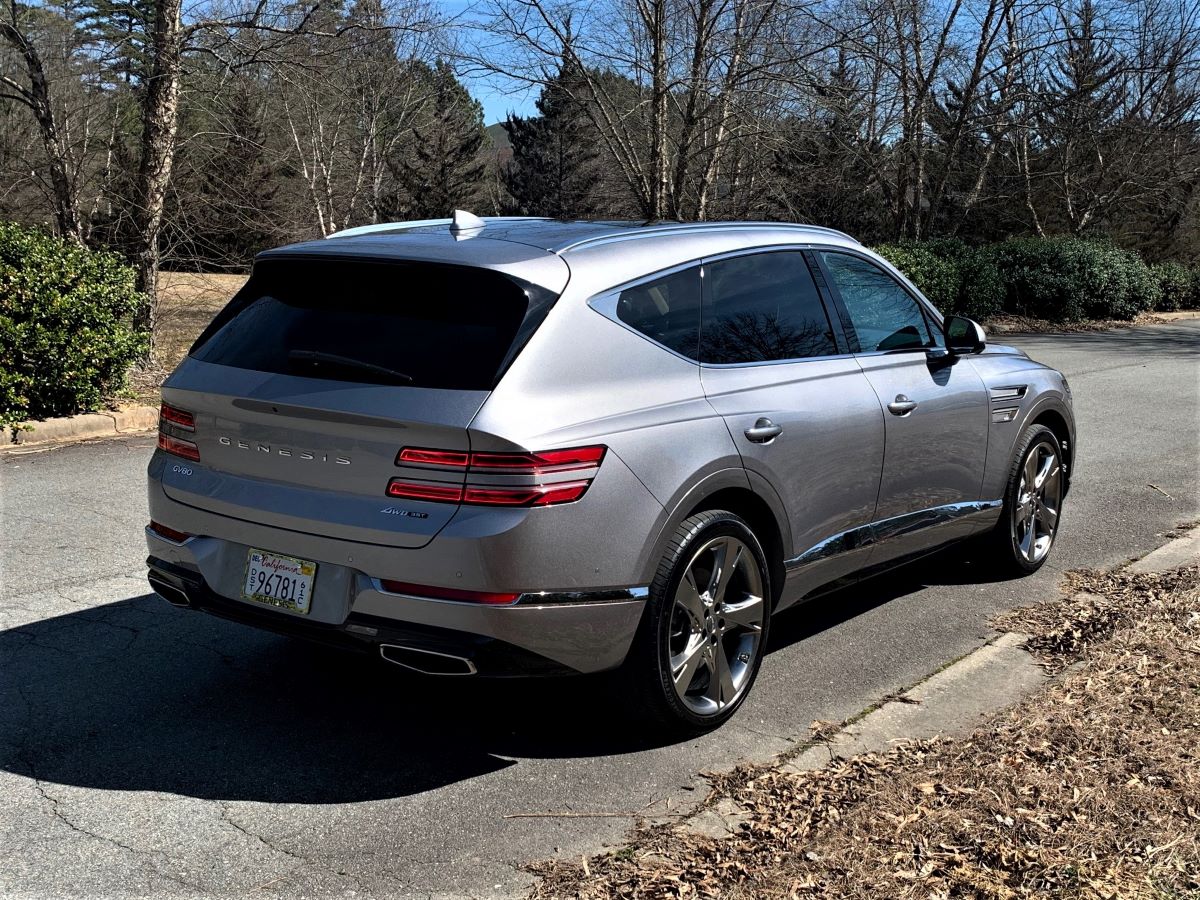
As for steering, the Genesis doesn’t rise to the same level of its German competitors – it isn’t as direct as we would like.
The GV80 benefits from multi-link front and rear suspension system, an available rear self-leveling suspension, or an electronically controlled suspension system with road preview. An electronic limited-slip differential is available with the V6.
In all, drivers should find the V6 more refined than the inline-four, with ride comfort quite good no matter the choice. Keep this latter point in mind, but it’s a strong suit for this Korean luxury brand.
Lastly, your fuel economy numbers will be hard-pressed to top 20 mpg with the V6 and only about 3 mpg better with the base engine. Add in standard premium gas for both and you’ll find costly fill-ups in these days of rising fuel prices.
Competitive Set
The Genesis GV80 competes against other luxury marques, domestic and foreign. Its chief U.S. competitors include the Cadillac XT6 and the Lincoln Aviator.
Among the German makes, the GV80 should be compared to the Audi Q7, BMW X5, Porsche Cayenne, and the Mercedes-Benz GLE Class. Other competitors include the Volvo XC90, Land Rover Range Rover Velar, Jaguar F-Pace, Acura MDX, Infiniti QX60, and the Lexus GX.
That’s a dozen models to shop, but the new Genesis makes a strong statement.
Our Recommendation
Our test model had the larger of the two engines and that’s something we would definitely recommend if you plan to carry a full contingent of passengers or tow. It’s not that we don’t think the base model with the four-cylinder engine and rear-wheel drive isn’t enough, but we think most customers will want something more.
In any case, a well-equipped model can be had for about $65,000 and that’s well within the range of where most competitors begin, with some well-equipped models pushing that magical six-figure range.
Happily, Genesis figured out a way to meet and even exceed customer expectations with a model that just may become the gold standard for the segment.
2021 Genesis GV80 Specifications
| Genesis | 2021 GV80 |
|---|---|
| Segment | Luxury Midsize SUV |
| Price Range | $48,900 to $65,550 |
| Destination Charge | $1,045 |
| Engine No. 1 | 2.5-liter, turbocharged I4 |
| Horsepower | 300 @ 5,800 rpm |
| Torque (lb.-ft.) | 311 @ 4,000 rpm |
| Transmission | 8-speed automatic |
| Engine No. 2 | 3.5-liter, twin-turbo V6 |
| Horsepower | 375 @ 5,800 rpm |
| Torque (lb.-ft.) | 391 @ 1,300 to 4,500 rpm |
| Transmission | 8-speed automatic |
| Seating | 5 or 7 |
| Curb Weight (pounds) | 4,506 to 5,104 |
| Wheelbase (inches) | 116.3 |
| Length (inches) | 194.7 |
| Width (inches) | 77.8 |
| Height (inches) | 67.5 |
| Storage (cubic feet) | NR |
| Gross vehicle weight (pounds) | NR |
| Towing (pounds) | 6,000 |
| Payload (pounds) | NR |
| Fuel | Premium |
| Fuel Tank (gallons) | 21.1 |
| EPA Fuel MPG (city/highway/combined) | 21/25/23 (I4); 18/23/20 (V6) |
| Manufacturing Plant | Ulsan, South Korea |
See Also – About the 2019 Genesis G70
Photos copyright Auto Trends Magazine. All rights reserved.
- 2024 Mazda CX-50: A Compact SUV with Premium Aspirations - Apr 15, 2024
- 2024 Ford Mustang (Iconic Pony Car Evolves) - Apr 4, 2024
- 2024 Ford Maverick (Looks Like a Truck, Drives Like a Car) - Mar 28, 2024

